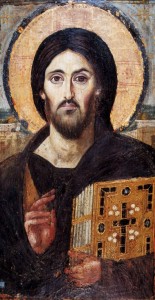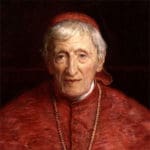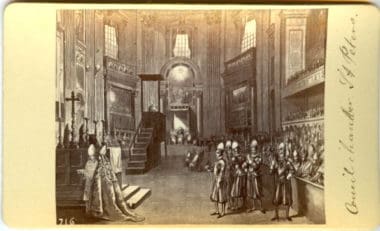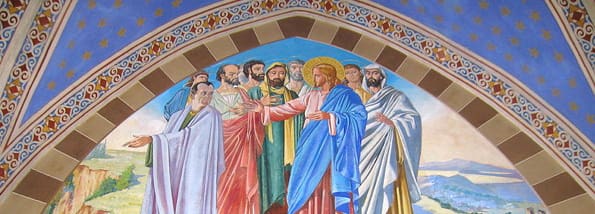Christ, the One Teacher of All (Mysticism and Magisterium: Part III of VI)
 We might summarize the previous two posts in this series by saying that we are called to think with the Church because Christ and the Church possess same Spirit who is present throughout history in the details. When the Church teaches, Christ teaches, and those who depart from the Church depart from Christ. In this post, we shall examine than manner in which Christ is the one Teacher of all.
We might summarize the previous two posts in this series by saying that we are called to think with the Church because Christ and the Church possess same Spirit who is present throughout history in the details. When the Church teaches, Christ teaches, and those who depart from the Church depart from Christ. In this post, we shall examine than manner in which Christ is the one Teacher of all.
In the gospel, the Greek word which we translate “disciple” means “learner” or “student.” Our Lord says to his disciples, that is, his students, not to be called teachers, for there is only one Teacher, the Christ (Mt 23:10). The Latin translation says do not be called magistri for only one is your magister. We derive the term “magisterium” from the Latin magister. Our Lord told those he was to appoint to teach in His name not to be called teachers because in order for them to do their job they would have to teach in and through Him alone.
![LucibelloEpiscopioMissioneApostoliPareteSx1945[Christ,Apostles,Gospel,Preach]](https://spiritualdirection.com/wp-content/uploads/2014/09/LucibelloEpiscopioMissioneApostoliPareteSx1945ChristApostlesGospelPreach-380x253.jpg) The function of Tradition is to transmit the deposit of faith from one generation to the next as Christ delivered it to the Apostles. The apostolic mark of the true Church assures that this function is realized within Catholic ecclesial body that Christ founded. This means that the bishops, especially the bishop of Rome, trace their succession back to the Apostles and have received through their ordination the mandate to teach in Christ’s name. Thus, in the bishops, “the task of authentically interpreting the word of God, whether written or handed on, has been entrusted exclusively to the living teaching office of the Church, whose authority is exercised in the name of Jesus Christ” (Dei Verbum 10).
The function of Tradition is to transmit the deposit of faith from one generation to the next as Christ delivered it to the Apostles. The apostolic mark of the true Church assures that this function is realized within Catholic ecclesial body that Christ founded. This means that the bishops, especially the bishop of Rome, trace their succession back to the Apostles and have received through their ordination the mandate to teach in Christ’s name. Thus, in the bishops, “the task of authentically interpreting the word of God, whether written or handed on, has been entrusted exclusively to the living teaching office of the Church, whose authority is exercised in the name of Jesus Christ” (Dei Verbum 10).
This does not mean that everything every bishop, or even the pope says is guaranteed to be without error. Nor is there any assurance that every bishop at each moment will fulfill his mandate to teach only as Christ and the Apostles taught. But the working of divine providence is not restricted to the exercise of papal infallibility or the solemn declarations and condemnations of ecumenical councils. Christ is present in the details and His providence is exercised in and through the Church that He founded.

Blessed John Henry Cardinal Newman (1801-1890), one of the greatest Catholic thinkers of the last several centuries, wrote extensively about the development of doctrine and the way in which the Church discerns legitimate doctrinal growth from the adulteration of Christ’s teaching. The Church hands on the faith from age to age in such a way that, while the deposit of faith remains one and the same, with the same meaning and the same sense, our understanding develops in an organic way over time.
An example of this development is the doctrine of papal infallibility, which is implicit in the patristic notion of the primacy of the Bishop of Rome, but was made explicit in the dogmatic declaration of the First Vatican Council in 1870. Newman had argued that it was inopportune to define the dogma, though he personally held the doctrine to be true. He was concerned about certain views he considered extreme, namely, that the pope was infallible virtually every time he spoke and that papal civil and political power was necessary to the exercise of the pope’s spiritual authority. Some of the proponents of this extreme theory, known as “ultramontanes,” believed that the consequences of a papacy without temporal power would be apocalyptic.
Newman was tempted to make his objections to the definition a matter of public record, but instead contented himself to address his concerns in a letter to his bishop. There he wrote that if it was indeed the Lord’s will to define the pope’s infallibility he would feel it necessary to “bow my head to His Adorable Inscrutable Providence.”
After the dogma was defined, Newman was determined to defend it, knowing that the outcome of the Council was guaranteed by divine providence. In fact, he found the formulation of Vatican I to be rather “moderate,” and this  allayed his concerns of extremism. He became a true defender of the dogma, precisely because he believed Christ is present in the details of history. He wrote that anyone “who believes the dogmas of the Church only because he has reasoned them out of History, is scarcely a Catholic.”
allayed his concerns of extremism. He became a true defender of the dogma, precisely because he believed Christ is present in the details of history. He wrote that anyone “who believes the dogmas of the Church only because he has reasoned them out of History, is scarcely a Catholic.”
At the same, while he held that only that which was solemnly defined by the Church demanded the assent of divine faith, he also taught that no good would ever come from opposition to papal teaching, even if not solemnly defined. Here he is worth quoting at length:
I say with Cardinal Bellarmine whether the Pope be infallible or not in any pronouncement, anyhow he is to be obeyed. No good can come from disobedience. His facts and his warnings may be all wrong; his deliberations may have been biassed. He may have been misled. Imperiousness and craft, tyranny and cruelty, may be patent in the conduct of his advisers and instruments. But when he speaks formally and authoritatively he speaks as our Lord would have him speak, and all those imperfections and sins of individuals are overruled for that result which our Lord intends (just as the action of the wicked and of enemies to the Church are overruled) and therefore the Pope’s word stands, and a blessing goes with obedience to it, and no blessing with disobedience (Letter to Lady Simeon, 10 November 1867).
Why is this? Because Christ is the one Teacher of all, whose Spirit operates in the Church, in spite of the defects of its ministers. Christ is present in the Church throughout its history in the details, and He is the one who guides it through the twists and turns of human frailty.
This is why there is a difference between the work of faithful theologians and the misrepresentation of dissenters and agitators. When considering a new magisterial teaching that is difficult to reconcile with the Church’s perennial teaching, faithful theologians and other qualified individuals will work in harmony with Vicar of Christ and the bishops to clarify the issues and arrive at a solution that fosters complete ecclesial communion. On the other hand, dissenters and agitators undermine the authority of the Church and the simple faith of the people by their public opposition to magisterial teaching. This has the effect of creating further division with the Church and a weakening of ecclesial communion.
Only one is our Teacher, the Christ. No mere man, whether priest, theologian, apologist, catechist, journalist or blogger has a right to claim that place, or to usurp the rights and duties of the bishops, especially that of the Holy Father. And hence, once again, we see why it is that St. John Paul II, Benedict XVI and Pope Francis have exhorted us always to think with the Church.
Editor’s Note: A listing of all the posts in the “Mysticism and Magisterium” Series can be found here.
+
Art: Christ the Saviour (Pantokrator), a 6th-century encaustic icon from Saint Catherine’s Monastery, Mount Sinai, oldest known icon of Christ Pantokrator, anonimus, PD-old-100; Fresco in Bishop’s chapel located in Cortona [Italy] depicting the mission of the apostles, Ignazio Lucibello, 31 December 1944, CCA-SA 3.0 Unported (public place); John Henry Newman, Sir John Everett Millais, date unknown (author died in 1896), CC-PD-Mark; Council Chamber St. Peter [First Vatican Council], Gioacchino Altobelli, 1874, CC-PD-Mark; all Wikimedia Commons.


